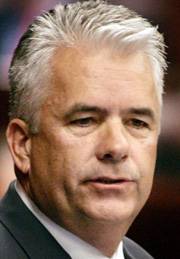Sunday, Dec. 19, 2010 | 2:01 a.m.

John Ensign

Dean Heller
Sun archives
- Obama signs massive tax bill, hails deal with GOP (12-17-2010)
- Tax package heads toward passage in Senate (12-17-2010)
- House passes tax extension bill (12-16-2010)
- Estate tax becomes focal point of tax extension debate (12-16-2010)
- Tax cuts the first crack in the Obama-Reid alliance? (12-8-2010)
- House to vote on Bush tax cuts for middle class (12-2-2010)
- Democrats plan vote on extension of tax cuts (12-1-2010)
- A discussion of tax-cuts’ effect on ill economy (9-23-2010)
Sun coverage
A week of fiscal scrabbling resulted in a lot of temporary tax-cut extensions, and one scrapped spending bill.
In the process, two presumed contenders for Nevada’s 2012 Senate race took to opposite philosophical corners; an interesting early split for two Republican lawmakers with commonly conservative roots.
Sen. John Ensign was one of a few conservative Republicans who broke from the pack to vote against a tax-cut bill hashed out between President Barack Obama and the GOP, saying that although the bill included important tax-cut extensions he supported, he couldn’t vote for a bill that added to the deficit without attempting to make cuts elsewhere.
“It’s good for the economy in the short term, but the debt is going to kill us in the not-too-long term,” Ensign said.
Across the Capitol, Rep. Dean Heller took the opposite stance.
Heller said he voted “to prioritize extending the tax cuts over my concerns about spending ... the good outweighs the bad in this particular piece of legislation,” he said. “Eighty-eight percent of this bill is tax cuts, or at least not tax increases. To me, 88 percent of this bill, I like.”
With supporters — including GOP leadership — painting the vote as do-or-die to avoid being hurled into the teeth of a second recession, Ensign’s stance was bold, and one taken by only a few other conservative senators, including anti-spending hawks Sens. Tom Coburn of Oklahoma, Jim DeMint of South Carolina and Jeff Sessions of Alabama.
That Ensign should be in their company isn’t all that unusual. He’s routinely ranked among the most conservative members of the Senate, receiving a score 94.37 out of a possible 100 from the American Conservative Union for his policy positions. That’s a few points higher than Heller’s lifetime rating of 89.33 percent.
Ensign has had ample time and reason to align his philosophies with some of those senators. Coburn and DeMint were fellow residents at the now-famous but defunct C Street house, and are the well-juiced keepers of the ignition keys to the Tea Party engine.
But Ensign breaks from the Coburns and DeMints of the Senate in one important area: earmarks. And that was enough to make him a focal point of indirect accusations of hypocrisy last week.
“You can all look it up in the dictionary yourself, but I bet that if you went to ‘H’ in the dictionary and found ‘hypocrite’, under that would be people who ask for earmarks but vote against them,” Senate Majority Leader Harry Reid said of Ensign and others who took such a position. “You can’t have it both ways.”
Despite advocating for a return to 2008 spending levels and threatening to vote against the now-dead federal omnibus budget bill, Ensign requested about $85 million in earmark spending for Nevada.
Here’s where Ensign parted ways with his potential 2012 challenger: Heller also said he wouldn’t vote for the omnibus bill — but didn’t ask for a dime in earmarks.
It will be months before Ensign or Heller will have to answer for these votes in a campaign setting — and only if both decide to run.
But with tax-and-spending issues all but guaranteed to come up on the campaign trail and before Congress during the run-up to the next election, it’s a salvo that’s likely to be recalled down the line.
Despite the discrepancy between their policy positions, Nevada’s Republican watchers said Ensign and Heller voted their conservative consciences. But with an ear toward future campaigns, they agreed that one’s vote seemed better poised to translate to the airwaves than the other’s.
“I think politically, Heller comes out better, because Ensign needs to explain his vote,” conservative blogger Chuck Muth said. “ ‘I voted not for continuing the tax cuts, but here’s why’ — the average voter, they aren’t really interested in that much detail, and on the surface, he voted against extending the tax cuts.”
These Republicans downplayed the significance of the Democrats’ accusations of hypocrisy on earmarks that seemed to stick to Ensign, but bypass Heller.
“In an overall statewide poll, I don’t think people would view pork spending as high as they would other issues,” said Robert Uithoven, a Republican political adviser. “We are a donor state — we give Washington far more money than we get in return. So as long as Nevada continues to be a donor state, I don’t think the pork issue is that big.”
Nevada Republican strategist Ryan Erwin said: “You certainly can make a principled statement that you don’t want earmarks ... but then you open yourself up to criticism that you didn’t go after $100 million in available spending for the state. It’s a can’t-win issue.”
Democratic Rep. Shelley Berkley is also considering a Senate bid, and she played an uncharacteristically central and vocal role in the tax-cut debate, challenging her own splintering caucus to vote not only for the full complement of tax cuts in the bill, but also the estate tax provision she helped draft. Her proposal made the bulk of the Democratic caucus balk at the package, but helped bring many Republicans on board.
Should Berkley run against Ensign, the accusations of hypocrisy are almost guaranteed to resurface.
Republican analysts say they doubt the threat of Democrats at the door are influencing the likely Republican contenders’ voting patterns just yet.
“I don’t think Dean Heller’s voting record is motivated by what John Ensign does, but I do believe it’s in the back of his mind,” Uithoven said.

Join the Discussion:
Check this out for a full explanation of our conversion to the LiveFyre commenting system and instructions on how to sign up for an account.
Full comments policy